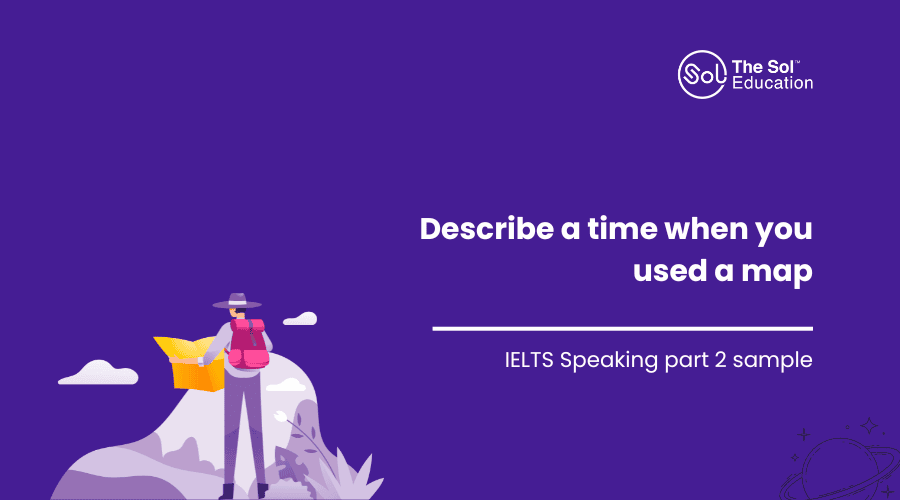Việc sử dụng bản đồ không còn là điều xa lạ với bất cứ ai trong chúng ta. Và đây cũng là một công cụ rất hữu ích khi chúng ta đi tới những nơi không quen thuộc hoặc khi tìm kiếm 1 địa điểm nào đó. Hãy cùng miêu tả 1 lần sử dụng bản đồ trong phần thi IELTS Speaking part 2 cùng SOL nhé.
Tham khảo thêm:
Describe a time when you used a map.
You should say:
I vividly recall a time during a solo backpacking trip when I found myself navigating the narrow alleys of an ancient city in Europe. It was a warm summer day, and I was exploring the charming streets filled with centuries-old architecture. I decided to venture off the beaten path, and that's when I realized my smartphone had lost its signal.
Feeling a bit disoriented but also intrigued by the unexpected adventure, I decided to rely on a good old paper map I had picked up from a local tourist information center earlier. Finding a shaded spot in a quaint café, I unfolded the map and began tracing the winding streets and landmarks.
Using the map brought a sense of nostalgia and charm to the experience. It required a bit more effort than the usual digital navigation, but it also offered a deeper connection to the surroundings. The tactile feel of the paper, the creases that marked previous journeys, and the detailed illustrations painted a more vivid picture of the city.
As I successfully navigated my way through the labyrinthine streets, the initial anxiety transformed into a sense of accomplishment. It wasn't just about reaching my destination but about embracing the journey and the unexpected detours that added layers to my travel story. The reliance on a paper map turned what could have been a moment of frustration into a memorable adventure, highlighting the beauty of simplicity in our tech-driven world.
Từ vựng tham khảo:
I vividly recall a time when I used a map during a solo trip to Hanoi, the bustling capital city of Vietnam. It was about a year ago during the summer.
I was exploring the Old Quarter, a maze of narrow streets filled with history and culture. Eager to discover hidden gems and local landmarks, I decided to navigate the labyrinthine streets armed with a detailed map. The reason behind using the map was to ensure I didn't miss out on any significant attractions and to find my way back to the hotel without getting lost.
As I strolled through the vibrant streets, the map became my trusted companion. It helped me locate historical sites, markets, and charming cafes that might have otherwise escaped my attention. Navigating through the unfamiliar alleys, I felt a sense of adventure and discovery, each turn revealing something new.
The experience of using the map enhanced my journey. It provided a tangible connection to the city's layout and history, making me feel more engaged with the local culture. While the map served as a practical tool for navigation, it also added an element of excitement to my exploration.
In the end, the map not only guided me through the labyrinth of Hanoi's Old Quarter but also contributed to the overall joy of discovering a new place. The sense of accomplishment I felt when successfully navigating the streets reinforced the idea that maps are not just navigation tools; they are companions that enrich the travel experience.
Từ vựng hữu ích:

When individuals find themselves lost, common practices include using navigation apps on smartphones or relying on in-car GPS systems. Seeking assistance from locals by asking for directions is also a prevalent approach. In some cases, people may refer to traditional paper maps as a backup. The key is to leverage available resources, whether technological or human, to regain a sense of direction and navigate the surroundings effectively.
Từ vựng tham khảo:
Common practices (noun phrase):[ˈkɒmən ˈpræktɪsɪz] - Thói quen phổ biến
Navigation apps (noun phrase):[nævɪˈɡeɪʃən æps] - Ứng dụng hướng dẫn đường đi
Rely on (phrasal verb):[rɪˈlaɪ ɒn] - Phụ thuộc vào
Prevalent (adjective):[ˈprɛvələnt] - Phổ biến
Refer to (phrasal verb):[rɪˈfɜːr tuː] - Tham khảo, sử dụng
Leverage (verb):[ˈlɛvərɪdʒ] - Tận dụng
Technological (adjective):[ˌtɛknəˈlɒdʒɪkəl] - Thuộc về công nghệ
Regain (verb):[rɪˈɡeɪn] - Lấy lại
Navigate (verb):[ˈnævɪɡeɪt] - Điều hướng
Paper and digital maps offer distinct advantages. Paper maps provide a tangible and straightforward representation, often appreciated for their reliability in areas with limited technology access. On the other hand, digital maps, accessible through smartphones or GPS devices, offer real-time updates, interactive features, and the convenience of route optimization. While paper maps evoke a sense of nostalgia and independence, digital maps provide dynamic and interactive solutions for modern navigation needs.
Từ vựng tham khảo:
Distinct (adjective):[dɪˈstɪŋkt] - Riêng biệt, khác biệt
Tangible (adjective):[ˈtænʤəbl̩] - Có thể chạm được
Reliability (noun):[rɪˌlaɪəˈbɪləti] - Độ tin cậy
Limited technology access (phrase):[ˈlɪmɪtɪd tɛkˈnɒlədʒi ˈæksɛs] - Sự truy cập công nghệ hạn chế
Accessible (adjective):[əkˈsɛsəbl̩] - Dễ tiếp cận
Real-time updates (noun phrase):[riəl taɪm ˈʌpˌdeɪts] - Cập nhật thời gian thực
Interactive features (noun phrase):[ɪntəˈræktɪv ˈfiːʧəz] - Tính năng tương tác
Convenience (noun):[kənˈviːniəns] - Tiện lợi
Route optimization (noun phrase):[rut ˌɒptɪmɪˈzeɪʃən] - Tối ưu hóa tuyến đường
Evoke (verb):[ɪˈvəʊk] - Gợi lên
Nostalgia (noun):[nɒˈstældʒɪə] - Nỗi nhớ xưa, hoài niệm
Independence (noun):[ˌɪndɪˈpɛndəns] - Tự lập
Dynamic (adjective):[daɪˈnæmɪk] - Linh hoạt, động đậy
Interactive solutions (noun phrase):[ɪntəˈræktɪv səˈluːʃənz] - Giải pháp tương tác
In-car GPS navigation systems are invaluable tools for modern navigation. They provide real-time guidance, traffic updates, and hands-free functionality, enhancing the overall driving experience. The convenience of voice prompts and visual cues allows for safer navigation. However, it's essential to strike a balance and not solely rely on these systems, as developing traditional map-reading skills remains valuable for unexpected situations or areas with poor satellite reception.
Từ vựng IELTS tham khảo:
Invaluable (adjective):[ɪnˈvæljuəbl̩] - Vô giá, không thể đánh giá được
Real-time guidance (noun phrase):[riəl taɪm ˈɡaɪdəns] - Hướng dẫn thời gian thực
Traffic updates (noun phrase):[ˈtræfɪk ˌʌpˈdeɪts] - Cập nhật thông tin giao thông
Hands-free functionality (noun phrase):[hændz-friː ˌfʌŋkʃəˈnæləti] - Chức năng không cần sử dụng tay
Enhance (verb):[ɪnˈhæns] - Nâng cao
Convenience (noun):[kənˈviːniəns] - Tiện lợi
Voice prompts (noun phrase):[vɔɪs prɒmpts] - Lời nhắc bằng giọng nói
Visual cues (noun phrase):[ˈvɪʒuəl kjuːz] - Dấu hiệu hình ảnh
Safer navigation (noun phrase):[ˈseɪfər nævɪˈɡeɪʃən] - Sự điều hướng an toàn hơn
Strike a balance (idiom):[straɪk ə ˈbæləns] - Đạt được sự cân bằng
Solely rely on (phrase):[ˈsoʊli rɪˈlaɪ ɒn] - Phụ thuộc hoàn toàn vào
Developing (present participle):[dɪˈvɛləpɪŋ] - Phát triển
Traditional map-reading skills (noun phrase):[trəˈdɪʃənl mæp-ˈriːdɪŋ skɪlz] - Kỹ năng đọc bản đồ truyền thống
Valuable (adjective):[ˈvæljuəbl̩] - Có giá trị
People use maps for various purposes, depending on their needs and circumstances. Common uses include planning travel routes, exploring unfamiliar areas, and locating specific points of interest. Maps are essential tools for outdoor activities like hiking or camping, where they provide guidance on terrain and landmarks. Additionally, maps are frequently employed for educational purposes, offering a visual representation of geographical features and historical context.
Từ vựng IELTS tham khảo:
Exploring (verb):[ɪkˈsplɔːrɪŋ] - Khám phá
Unfamiliar areas (noun phrase):[ʌnˈfəˌmɪliər ˈɛrɪəz] - Khu vực không quen thuộc
Locating (verb):[loʊˈkeɪtɪŋ] - Xác định vị trí
Specific points of interest (noun phrase):[spɪˈsɪfɪk pɔɪnts ʌv ˈɪntrəst] - Điểm đặc biệt
Essential tools (noun phrase):[ɪˈsɛnʃəl tuːlz] - Công cụ quan trọng
Outdoor activities (noun phrase):[ˈaʊtˌdɔr ækˈtɪvɪtiz] - Hoạt động ngoại ô
Hiking (noun):[ˈhaɪkɪŋ] - Leo núi, đi bộ đường dài
Guidance (noun):[ˈɡaɪdəns] - Hướng dẫn
Landmarks (noun):[ˈlændˌmɑːrks] - Địa danh nổi tiếng
Frequently employed (adjective phrase):[ˈfriːkwəntli ɪmˈplɔɪd] - Thường xuyên sử dụng
Educational purposes (noun phrase):[ˌɛdʒuˈkeɪʃənl ˈpɜːpəsɪz] - Mục đích giáo dục
The preference for paper maps often stems from the tangible and tactile experience they offer. Unlike digital maps, paper maps don't rely on technology, making them reliable in areas with poor connectivity or during travel. Many individuals appreciate the simplicity of unfolding a paper map and tracing routes with their fingers. There's a nostalgic and authentic feel to using a paper map, creating a more immersive and memorable navigation experience for users.
Từ vựng IELTS tham khảo:
Tangible (adjective):[ˈtænʤəbl̩] - Có thể chạm được
Tactile (adjective):[ˈtæktaɪl] - Thuộc về cảm giác
Digital maps (noun phrase):[ˈdɪdʒɪtl mæps] - Bản đồ số
Connectivity (noun):[kəˌnɛktɪˈvɪti] - Tính kết nối
Simplicity (noun):[sɪmˈplɪsɪti] - Sự đơn giản
Unfolding (verb):[ʌnˈfoʊldɪŋ] - Mở ra
Tracing (verb):[ˈtreɪsɪŋ] - Theo dõi, vẽ theo
Nostalgic (adjective):[nɒˈstældʒɪk] - Hoài niệm
Authentic (adjective):[ɔˈθɛntɪk] - Chân thực, đích thực
Immersive (adjective):[ɪˈmɜrsɪv] - Đắm chìm, sống động
Memorable (adjective):[ˈmɛmərəbl̩] - Đáng nhớ
Navigation experience (noun phrase):[ˌnævɪˈɡeɪʃən ɪksˈpɪəriəns] - Trải nghiệm điều hướng
Learning to read a map is a gateway to understanding the geography and spatial relationships within one's country. It encourages exploration and curiosity about different regions, landmarks, and historical sites. By interpreting maps, individuals gain insights into the topography, natural features, and cultural diversity of their country. It fosters a sense of national identity and appreciation for the unique characteristics that make each region distinct, contributing to a richer understanding of the country's heritage.
Từ vựng IELTS tham khảo:
Exploration (noun):[ˌɛkspləˈreɪʃən] - Khám phá
Curiosity (noun):[kjuːriˈɒsəti] - Tính tò mò
Interpreting (verb):[ɪnˈtɜːprɪtɪŋ] - Hiểu, giải nghĩa
Topography (noun):[təˈpɒɡrəfi] - Địa hình học
Natural features (noun phrase):[ˈnætʃərəl ˈfiːʧəz] - Đặc điểm tự nhiên
Cultural diversity (noun phrase):[ˈkʌltʃərəl daɪˈvɜrsɪti] - Đa dạng văn hóa
Fosters (verb):[ˈfɒstəz] - Tạo điều kiện, khuyến khích
National identity (noun phrase):[ˈnæʃənl aɪˈdɛntəti] - Bản dạng quốc gia
Appreciation (noun):[əˌpriːʃɪˈeɪʃən] - Sự đánh giá, trân trọng
Unique characteristics (noun phrase):[juːˈniːk ˌkærɪktəˈrɪstɪks] - Đặc điểm duy nhất
Distinct (adjective):[dɪˈstɪŋkt] - Riêng biệt
Mong rằng bài viết này sẽ giúp ích cho các bạn.
Thân mến,
